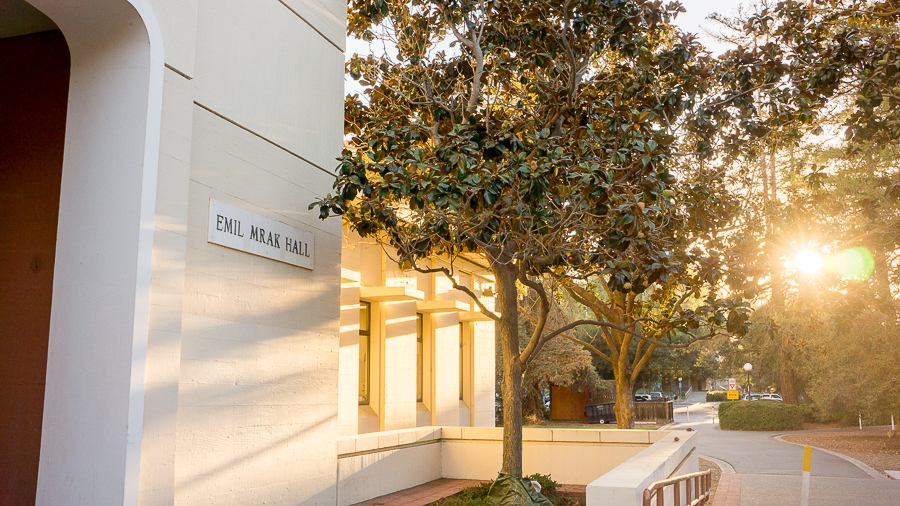
Undergraduate, graduate students to represent student body
On Sept. 13, 2016, University of California (UC) President Janet Napolitano announced plans to create an advisory committee to assist in the search for a new chancellor at UC Davis.
Elly Oltersdorf, a fourth-year history major and co-chair of the Student Council on Campus Climate, and Brian Riley, a current Ph.D candidate at the UC Davis School of Education and former chair of the Graduate Student Association (GSA), will serve on the 17-person committee.
The committee, which will help recruit, evaluate and interview candidates for the position, will help to find a reputable candidate that Napolitano can then present to the Board of Regents for consideration.
Associated Students of the University of California, Davis (ASUCD) President Alex Lee was asked in August to present an undergraduate representative for the committee.
“In August I was contacted by the University of California Office of the President (UCOP) and they said, ‘there is that one seat for the undergraduates. As ASUCD president, please pick [a representative],’” Lee said. “I thought it would be very appropriate to have an undergraduate student who was there at the forefront of the movement that ousted [former Chancellor Linda P. B.] Katehi.”
Along with Oltersdorf and Riley, the committee also includes Napolitano; Monica Lozano, UC Board of Regents chair; several UC Regents; Shane White, vice-chair of leadership for the UC systemwide Academic Senate; Debby Stegura, president of the Cal Aggie Alumni Association; Mike Child, the former president of the UC Davis Foundation; and Jessica Potts, chief administrative officer in the Department of Chemistry and former chair of the UC Davis Staff Assembly.
UC Davis faculty representatives who will attend the meetings include Diana Farmer, professor and chair of the Department of Surgery, professor of history Ari Kelman and Rachael Goodhue, chair of the Davis Academic Senate and professor and chair of Agricultural and Resource Economics.
The committee had its first meeting on Sept. 27 at the UC Davis Pavilion in a closed session. The group plans to reconvene several more times before January, when President Napolitano and the regents tentatively hope to decide on a chancellor.
Oltersdorf spoke at a student town hall meeting at Wellman Hall the day before the committee’s first deliberation, and she desires to gather as much student input as possible during the selection process.
“I feel really wary about the idea of trying to represent all undergraduate students at UC Davis,” Oltersdorf said. “[…] On the other hand, I feel very optimistic about the ability of students to mobilize. I think that if students feel that the process is unfair, then the committee should know about it. As a representative, if there’s something that I am taking away from this meeting, it is a lot of dissatisfaction on the part of the students in reaction to this process so I’ll definitely be taking that with me to the meeting tomorrow.”
As UC Davis’ graduate student representative, Riley will join Oltersdorf in expressing student concerns over the selection of a new chancellor. Katrina Brock, the chair of the Graduate Student Association, facilitated UCOP’s request for a representative and noted Riley’s background in education as a reason for his selection.
“He has a lot of experience working for students and working with [administration] for students, so I feel like he could be a good bridge,” Brock said. “He knows the system but he is still listening to students and […] even five years after he ended his chair position at GSA, he is still involved in GSA and serving and participating.”
Speaking about the process used in selecting the new chancellor, Oltersdorf expressed dissatisfaction with the title of her role and how the UC has decided to proceed.
“I think that, for me, “student representative” is almost a misnomer because I think that representative implies […] that there was some democratic process involved and I was not selected democratically,” Oltersdorf said. “The movement that I was involved in last year definitely tried its best to keep things completely democratic, to not have one leader but instead have a cohesive group of people that worked on a consensus basis and that constantly tried to let in outside voices […] The process set up by the regents makes this extraordinarily hard. It’s going to be a challenge.”
Written by: Ivan Valenzuela — campus@theaggie.org





